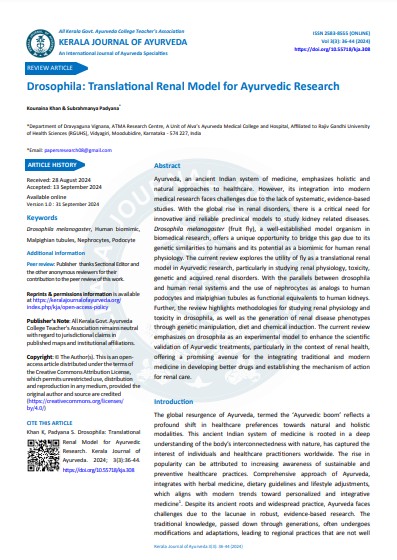Drosophila: Translational Renal Model for Ayurvedic Research
DOI:
https://doi.org/10.55718/kja.308Keywords:
Drosophila melanogaster, Human biomimic, Malpighian tubules, Nephrocytes, PodocyteAbstract
Ayurveda, an ancient Indian system of medicine, emphasizes holistic and natural approaches to healthcare. However, its integration into modern medical research faces challenges due to the lack of systematic, evidence-based studies. With the global rise in renal disorders, there is a critical need for innovative and reliable preclinical models to study kidney related diseases. Drosophila melanogaster (fruit fly), a well-established model organism in biomedical research, offers a unique opportunity to bridge this gap due to its genetic similarities to humans and its potential as a biomimic for human renal physiology. The current review explores the utility of fly as a translational renal model in Ayurvedic research, particularly in studying renal physiology, toxicity, genetic and acquired renal disorders. With the parallels between drosophila and human renal systems, and the use of nephrocytes as analogs to human podocytes and malpighian tubules as functional equivalents to human kidneys. Further, the review highlights methodologies for studying renal physiology and toxicity in drosophila, as well as the generation of renal disease phenotypes through genetic manipulation, diet, and chemical induction. The current review emphasizes on drosophila as an experimental model to enhance the scientific validation of Ayurvedic treatments, particularly in the context of renal health, offering a promising avenue for the integrating traditional and modern medicine in developing better drugs and establishing the mechanism of action for renal care.





